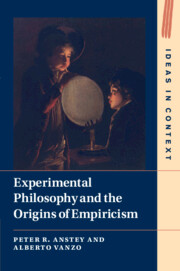Book contents
- Experimental Philosophy and the Origins of Empiricism
- Ideas In Context
- Experimental Philosophy and the Origins of Empiricism
- Copyright page
- Contents
- Figures
- Tables
- Acknowledgements
- A Note on Citations
- Abbreviations
- Introduction
- Part I The Rise of Experimental Philosophy
- Part II The Heyday of Experimental Philosophy
- Part III From Experimental Philosophy to Empiricism
- Conclusion
- Manuscripts Cited
- Newspapers, Broadsheets, and Almanacs
- References
- Index
Introduction
Published online by Cambridge University Press: 17 February 2023
- Experimental Philosophy and the Origins of Empiricism
- Ideas In Context
- Experimental Philosophy and the Origins of Empiricism
- Copyright page
- Contents
- Figures
- Tables
- Acknowledgements
- A Note on Citations
- Abbreviations
- Introduction
- Part I The Rise of Experimental Philosophy
- Part II The Heyday of Experimental Philosophy
- Part III From Experimental Philosophy to Empiricism
- Conclusion
- Manuscripts Cited
- Newspapers, Broadsheets, and Almanacs
- References
- Index
Summary
The Introduction provides the rationale for the writing of a history of early modern experimental philosophy and introduces the book’s major themes. It opens with a discussion of the meaning of the term ‘experimental philosophy’ and explains how it should be differentiated from contemporary x-phi and the historiographical category of empiricism. We claim that ‘experimental philosophy’ initially referred to a method for acquiring knowledge of nature that prioritises observation and experiment over theory, but it soon became the referent for the movement of experimental philosophers – as its practitioners called themselves – and for the actual knowledge acquired by this method. The Introduction then sets out some of the broader philosophical context in which experimental philosophy emerged, including the role of principles, the two-step approach to developing a science of nature, the experimental/speculative distinction, its employment of a form of natural history deriving from Francis Bacon, and a clutch of philosophical problems that impinged on this new approach to knowledge acquisition. These include the problems of how we get epistemic access to the essences of material things, how to articulate the precise relationship between experiment and observation on the one hand and theory on the other, and the roles of natural history and mathematics in experimental natural philosophy. The Introduction concludes with a summary of each chapter of the book.
Keywords
- Type
- Chapter
- Information
- Publisher: Cambridge University PressPrint publication year: 2023

